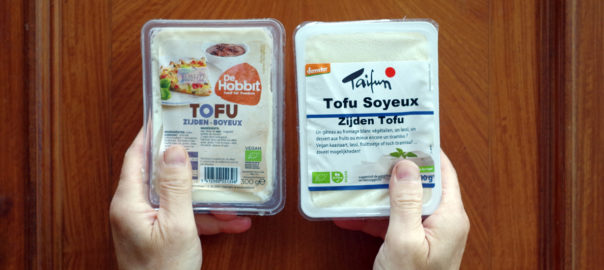Yoga Kitchen – Simple, healthy, and plant-based
Two tofus, yet so different
I cannot repeat it enough. The food industry does not have the slightest interest in or commitment to our health or well-being. It is a big >
machine whose motto is to make as much money as possible. Give as little quality as possible, and make the consumer pay for it as much as possible. You may think that I am exaggerating, but the reality is often much more shocking. Sometimes I feel that words are inadequate.
The yoga of nutrition
Yoga is, among other things, about developing consciousness. And you can’t have enough consciousness. Certainly not when it comes to food.
In a recent press article, plant-based milk substitutes were pretty much destroyed because, with only a few exceptions, they were judged to be of very poor nutritional value.
What is true in that story is that there are indeed many manufacturers who shamelessly put watery concoctions in tetra packs on sale for far too much money. In those cases, you can just as well drink ordinary tap water for a fraction of the price.
What is wrong with that story is that plant-based milk substitutes are by definition poor in nutritional value. Good soya, almond or oat milk, preferably homemade from beans, grains or nuts of organic origin, can easily withstand the comparison with animal milk. At least, if you take all the health parameters into account.
A matter of business ethics
And there are indeed a handful of manufacturers in the food sector who still do efforts to offer you quality. In the context of plant-based milk substitutes, the percentage of protein is a good measure of quality. This is directly proportional to the amount of nuts, beans or grains added in the production process.
Just compare the different brands. Compare, for example, the percentage of protein in the organic almond milk of the Italian brand Valdibella, with that of the almond milk of the market leader Alpro, which is more often than not in the doldrums. Then price differences suddenly appear in a completely different light, and a low price is often synonymous with total delusion.
Read the labels and learn how to interpret them
We have little or no means of really checking what is added to pre-packaged food. Yes, there are the labels. But even there we are never sure if the legal minimums of average composition stated on them correspond to reality.
The differences in composition between manufacturers sometimes affect the recipes for home made preparations.
For example, take the product known as “silken tofu” An example of such a recipe with silken tofu can be found here on this blog.
Tofu is essentially a type of vegetable cheese, which, like cheese of animal origin, is made after a process of curdling soy milk. Silken tofu is a creamier, softer and more liquid version of classic tofu. It can be used to prepare dishes with a cream or cream cheese-like texture.
Let us have a look at what three very respectable manufacturers of soy products are offering.
Both manufacturer De Hobbit from Belgium, manufacturer Taifun from Germany, and Clearspring from the UK certainly belong to the world top when it comes to organic soy products that are in principle (*) free of genetically modified soy.
All kinds of silken tofu are sold under the same name (silken & smooth tofu).
See below for the composition as stated on the labels:
Silken tofu from Clearspring, per 100 g product
| Energy | Carbohydrates | Sugars | Fat | Sat. fat | Protein | Fibre | Salt |
|---|---|---|---|---|---|---|---|
| 257 kJ/61 kcal | 2,8 g | 1,1 g | 2,7 g | 0,5 g | 6,5 g | No info | 0 g |
Silken tofu from De Hobbit, per 100 g product
| Energy | Carbohydrates | Sugars | Fat | Sat. fat | Protein | Fibre | Salt |
|---|---|---|---|---|---|---|---|
| 353 kJ/85 kcal | 2,1 g | 0,8 g | 4,0 g | 0,7 g | 7,8 g | No info | 0 g |
Taifun’s silken tofu, per 100 g product
| Energy | Carbohydrates | Sugars | Fat | Sat. fat | Protein | Fibre | Salt |
|---|---|---|---|---|---|---|---|
| 202 kJ/48 kcal | 1,8 g | <0,5 g | 2,1 g | 0,5 g | 5,3 g | No info | <0,01 g |
The rather huge difference in protein and fat content explains why the Hobbit’s silken tofu has a much thicker texture than Taifun’s silken tofu. The one made by Taifun contains more water. You sometimes have to take this into account in recipes, because the creaminess and the end result can be quite different.
Calcium or magnesium?
And there is another important distinction between the two. In order to make soy milk curdle, salts are usually used in the industry. These are either:
- Calcium salts
- Magnesium salts
According to its label, De Hobbit uses calcium sulphate
On the other hand, Taifun and Clearspring use, according to their label, magnesium chloride
This means that you cannot make a general statement about the high calcium content of tofu. There is simply not a general rule. Everything depends on which salt is used. And that’s tend to differ from one manufacturer to another.
For vegans, this does have important consequences. After all, they do not consume calcium from animal dairy products, something that vegetarians or omnivores do.
For vegetarians, the distinction is less important.
Conclusion:In case of doubt between product A and product B, always rely on the facts that are mentioned on the labels. A warned consumer is worth two!
Genetically modified soy
(*) When we say that both manufacturers’ soy products are in principle free from GMO soy, we mean that both use cultivation methods that are in line with the organic cultivation methods in Europe, which starts with natural, unmanipulated seed. However, GMO-soy contamination can of course never be ruled out completely. That is one of the unpredictable consequences of the fact that genetically modified soya is allowed to be used elsewhere in the world, and also reaches our regions in animal feed.
Why are soybeans being genetically manipulated?
The phytopharmaceutical industry has placed on the market artificially genetically manipulated variants of various plant species, including soy, which have mainly been made resistant to pesticides. These seeds, together with the accompanying, often dangerous pesticides (think of Monsanto’s RoundUp) are sold to farmers with the promise of much higher crop yields. The consequence is that it is in fact an incentive to use even more pesticides.
Read more about plant-based nutrition and health:
Read more articles about nutrition, health and plant-based foods:
Read more about plant-based food
Read more about yoga and yoga classes in Schaerbeek:
Check out our yoga classes here:

